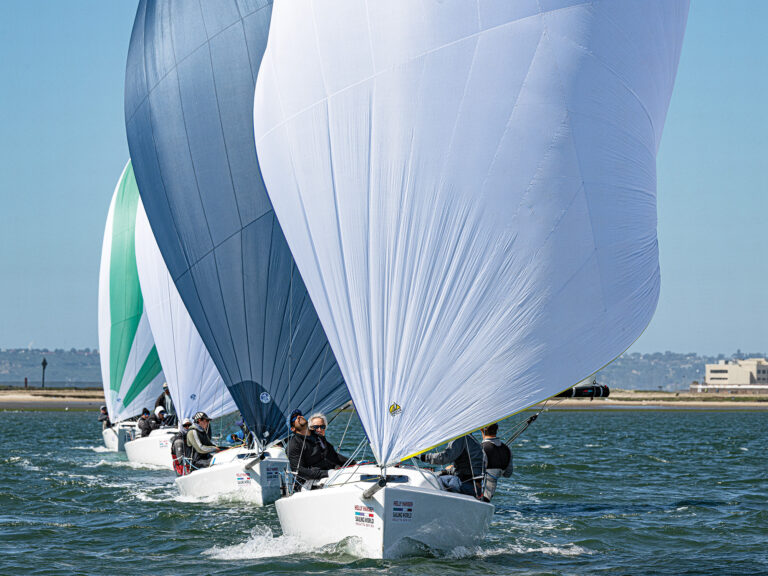I have recently received a spate of readers questions involving race committees and protests. Ill take a crack at answering them this month. For a couple of the questions, the rulebook provides no clear answer. So Ill go out on a limb and hope none of you have a saw.
Bernie Kuse wrote as follows: Is there any chance of changing the rules on protests to allow a race committee member or a judge who intends to protest to hail Protest to the protestee right after the incident? This would give that sailor a chance to do a 720. As it is now the protesting official is only required to inform the protestee after the race, far too late for the competitor to take a penalty. This just doesnt seem fair to the sailors.
Bernie is correct; to make a valid protest against a boat, a race committee member or a judge must, after the race and during protest time, inform the protestee and deliver the written protest (Rules 61.1(b) and 61.3). I agree with you that it seems unfair that there is no requirement to notify the boat on the water right after the incident occurs so that the boats crew has a chance to do a 720. The rules writers had a lengthy debate on this issue when Rule 61.1(b) was revised for the 2001 rulebook, but Bernies position didnt prevail because race committee members and judges are often not in boats that would enable them to get in close enough to notify the protested boats.
I believe, as does Bernie, that, whenever possible, a race committee member or a judge should hail Protest to a boat that he or she wants to protest right away so that the boat has a chance to do a 720. Its important to note that no rule prohibits such a hail, and I would encourage all those who serve on race committees and as judges to make those hails whenever it is possible to do so. If this process is to be used, then the sailing instructions should state, A race committee member or a judge intending to protest a boat for an incident during the race will attempt to hail Protest to that boat. Redress will not be given if such a hail is not made or is delayed. (This changes Rules 61.1(b) and 62.1(a)).
What if protests are never heard? Two readers have had problems with protests not being heard. A reader whom I will call Stan sails in a successful and very competitive frostbite fleet with over thirty boats on the line each Sunday. His fleet has a novel way of handling protests, they dont. There simply is no protest committee and protests are not accepted. The fleet captain told Stan that the no-protest policy was adopted some years ago to make the post-race parties fun for all. Stan asked if I know of any ways to handle protests that might be fun and, on a more technical note, what a competitor who wishes to protest can do when the race committee refuses to even accept a protest.
Here are a couple of ways you might handle protests and still have fun. The simplest, most informal way is for three or four of the most knowledgeable sailors in the fleet to volunteer to dispense instant justice. Under this system, the protestor finds the protestee on shore after the race and, together, they consult with one of the dispensers of instant justice. They each tell their side of the story, and the dispenser dispenses. This process can even be carried out on the water between races if there is time. The loser buys the dispenser a drink. (Of course, such a system must be described in the sailing instructions and any rules changed must be identified. See Rule 86.1(b).)
A more formal system can be arranged by contacting your US SAILING Regional Area Judge who should be able to provide the names of several local US SAILING Judges and of people interested in becoming US SAILING Judges. If these volunteers hear protests for the fleet, then the fleet can party and those who want to have a protest heard can do so.
If the fleet does arrange to hold protest hearings, it should consider conducting open hearings. I discussed this idea in this column in December, 2001. Open hearings are more fun for everyone, except perhaps the protestor and protestee.
If there is simply no provision for a protest to be heard, then the organizing authority and the race committee are not fulfilling the obligations that Rule 85 places on them. In that case, a letter of complaint to US SAILING might get some action.
Andrew Shemella asked a question about a situation that arose after he served as a one-man race committee for a race held on Peconic Bay, Long Island. A protest was delivered during protest time, and Andrew promptly passed it along to the person within his club responsible for organizing protest hearings. Some months have gone by, and that person has never held a hearing. Andrew asks what he should do.
Rule 63.1 says, “The protest committee shall hear all protests¿that have been delivered to the race office¿” Rule 89 permits the race committee to appoint a protest committee. Since the person responsible for organizing hearings is not doing his job, Andrew, who served as the race committee for the race in which the protest was made, has the right and the obligation under Rule 85 to appoint a protest committee and make sure that it promptly hears the protest.
Does a protest have to be on an official protest form?
Andrew also asked whether there is a rule requiring that a protest be written on an official US SAILING protest form. There is no racing rule that requires that protests be written on any particular form. Unless the sailing instructions require a particular form to be used, any piece of paper will do. Rule 61.2 lists the information that a protest should contain, but it goes on to say that the protest need only identify the incident, and that the other requirements of Rule 61.2 may be met before or during the hearing. Nevertheless, I do suggest, particularly for large regattas, that the protest committee make the US SAILING protest form available to competitors because use of the form makes life simpler for the committee.
Rights at a finish line mark.
Paul Lockwood asked a question about the rules that apply to boats in the position shown in the diagram. The race committee set just two marks – S, the pin end of the start/finish line, and W, the windward mark. The course was: start, round W, S, W, and then finish, leaving the rounding marks to port.
As shown in the diagram, Steve and Portia were running on opposite tacks approaching the two-length zone around the pin-end mark of the start/finish line. Steve was on starboard tack and Portia on port. Portia was sailing a speedy boat that had started in the first start of the day. Steve was in a slower boat that had started later in the starting sequence. At the time the boats reached the position shown in the diagram, Portia was en route to her finish and Steve was about to round mark S at the end of his first lap. Paul asks, What rules apply if Portia hails Steve for room so she can leave mark S to starboard and finish and, simultaneously, Steve demands room from Portia so that he can round mark S to port?
Rule 18 normally covers situations involving room at a mark. However, it applies at a mark only when boats are about to round or pass a mark they are required to leave on the same side¿ (Rule 18.1). In this situation, the boats were required to leave the mark on different sides – Portia was required to leave it to starboard and Steve to port. Therefore, Rule 18 does not apply, and the applicable rule is the basic right-of-way rule, Rule 10, which requires Portia to keep clear of Steve. Portia is not entitled to room from Steve to leave mark S to starboard. Her best tactic would be to slow her boat, take Steves stern and finish.
When I am asked a question like this, I wish there were some way to penalize the race committee! Courses should never require some boats to leave a particular mark to port and other boats to leave that same mark to starboard. The rules were simply not written with such courses in mind. Setting such courses can result in dangerous and expensive collisions (see, for example, ISAF Case 26).
E-mail for Dick Rose may be sent to rules@sailingworld.com.









